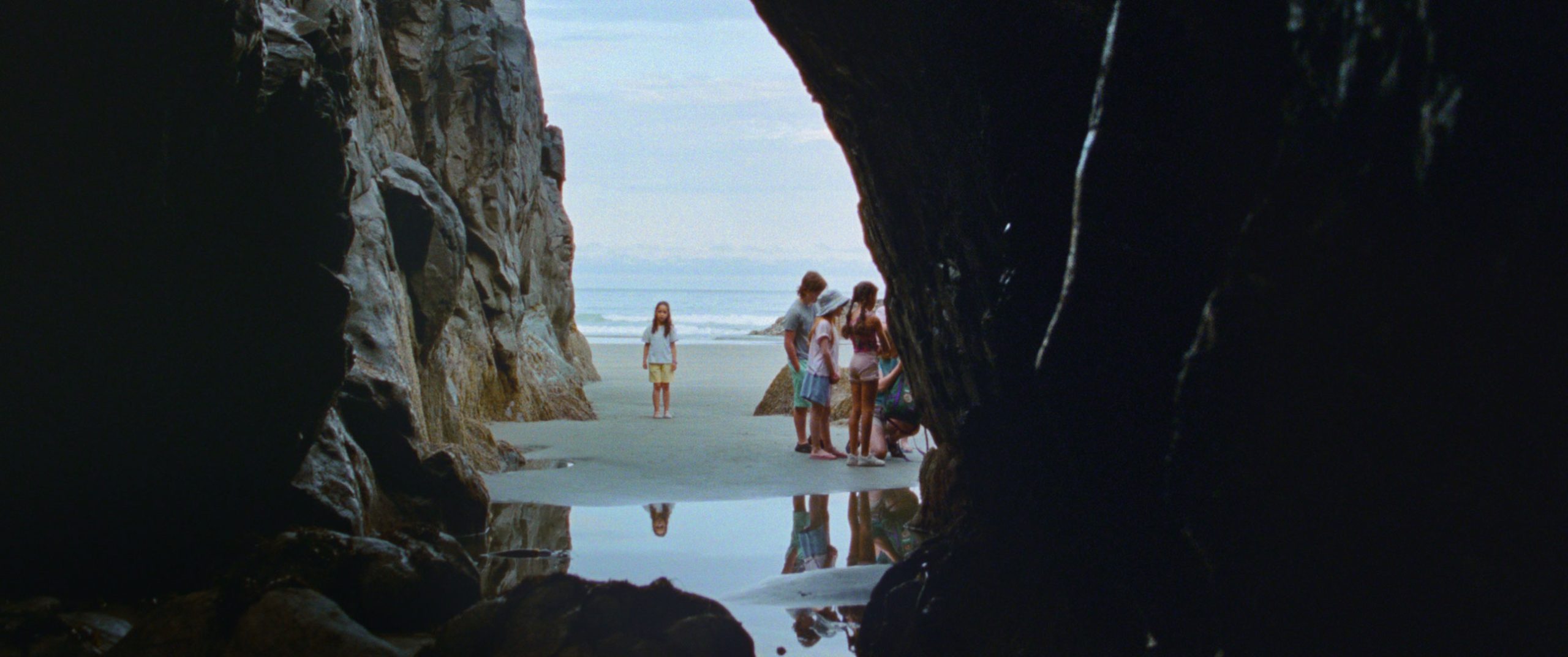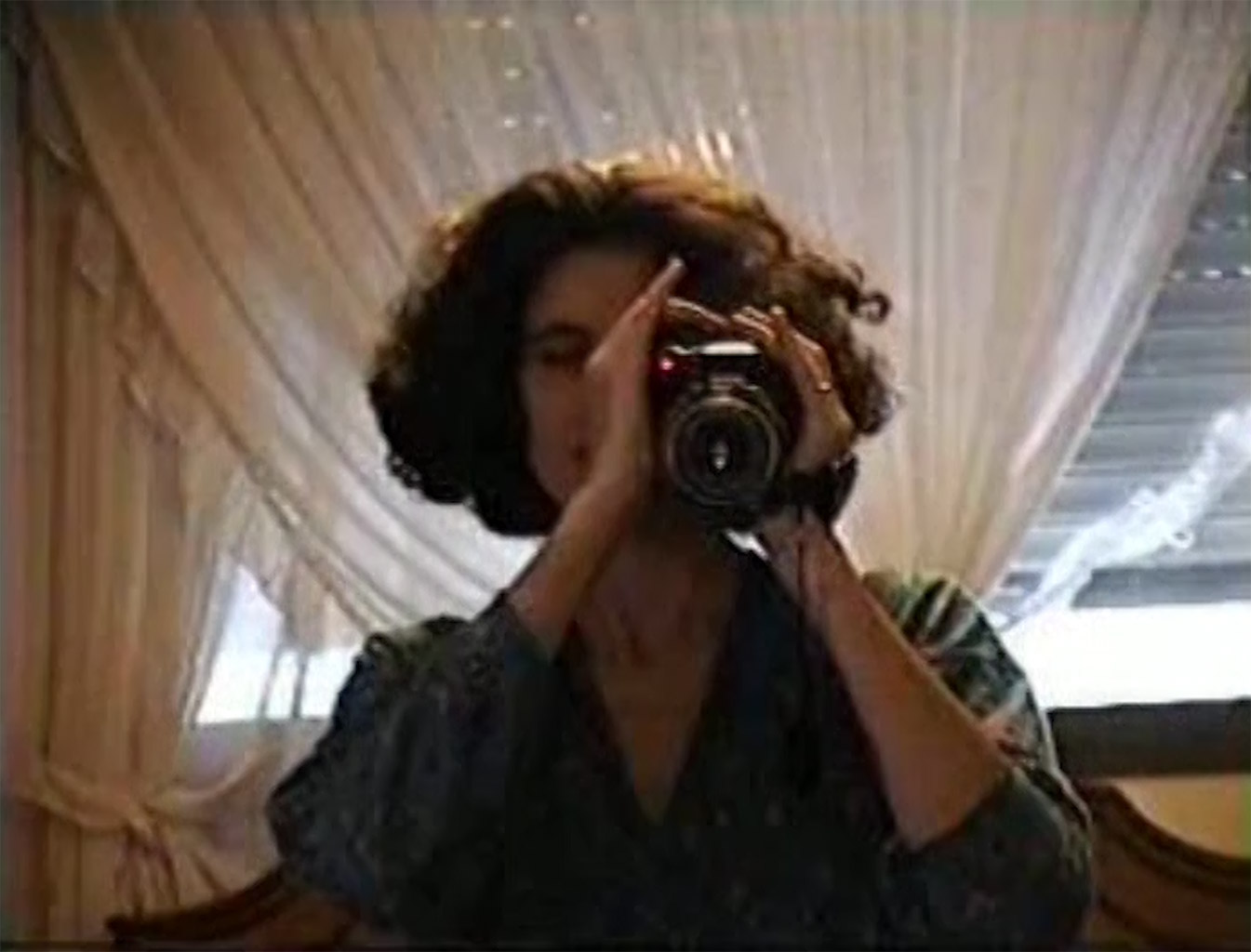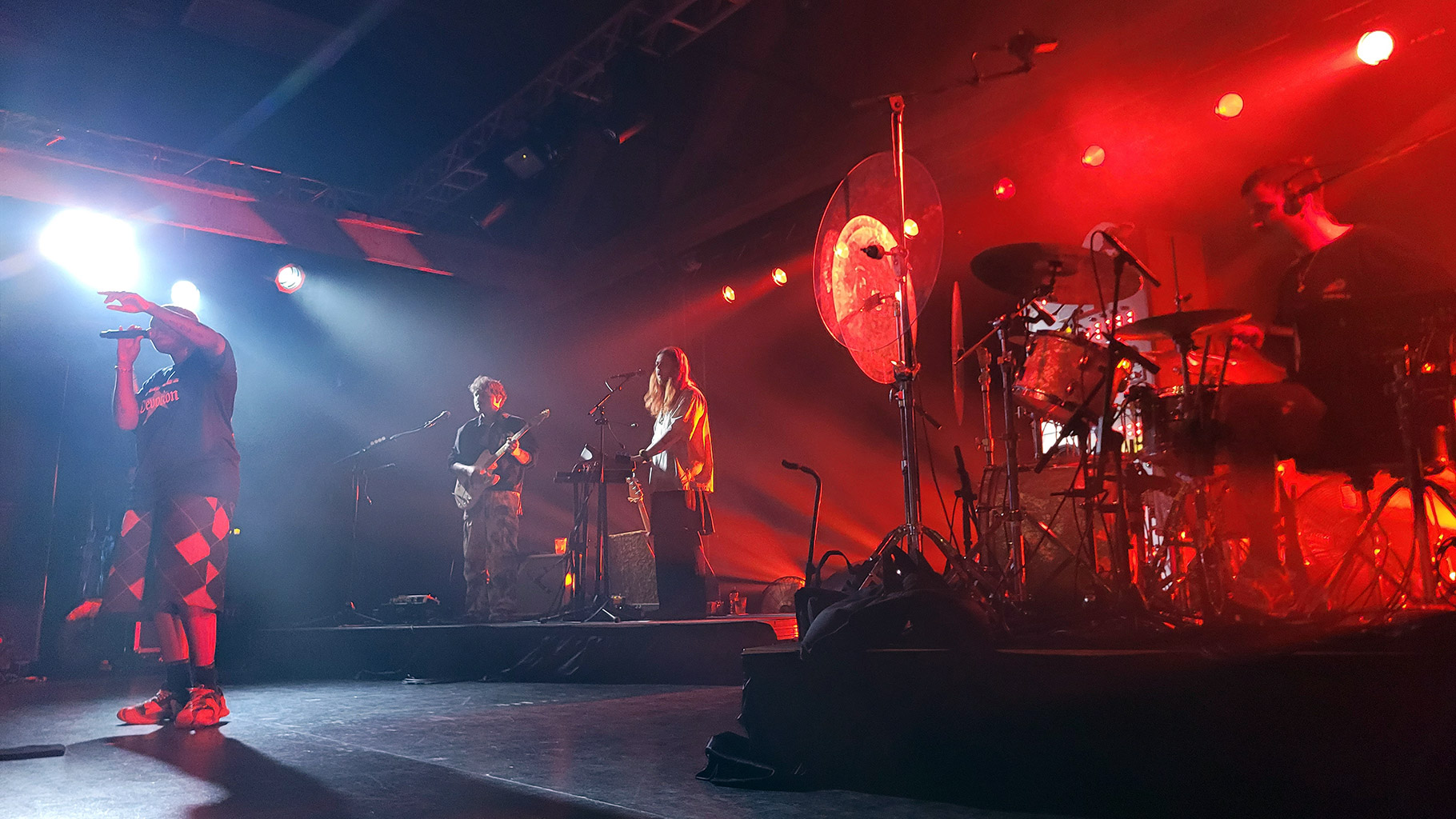
Kiev’s grassroots tactics, which they’re perfecting while promoting their debut full-length album, Falling Bough Wisdom Teeth, entail “sticking to your guns and making music you want to make, and knowing that it takes getting people in a room. It means playing shows to all different types of audiences, and hitting the road. It means doing things you love, which for us means making live performance videos, sharing them, and hoping that people get turned on to them in a genuine way and want to share them, as opposed to just being sort of click-bait or a sort of spectacle that gets popular really fast and then dies off really fast.”
Audio-Visual Mixers & Matchers
Part of what’s exciting about the hyper-recombinant, mix-and-match world of 2014 is that eclecticism can thrive under the radar in its own scrappy ways before someone assigns a catchy name to it and puts it in line with the establishment’s rank and file. Kiev, still a young band despite having formed in 2007, exist in this eclectic space, having been described by recent tourmates Bad Suns as “gypsy hippies, but metropolitan techie hi-fi nerd guys.” Or, as Brinkerhoff himself puts it, “hybrid models”. That means they hang out in Joshua Tree and throw “aleatoric happenings,” but those happenings include electronic instruments and visual projections against desert mountains. Brinkerhoff’s film school background — he went to Orange’s Chapman University — lends itself to the quintet’s ace in the hole, the use of live, stereoscopic 3-D projections in their concerts.
The 3-D projections were “designed by our immediate community,” explains Brinkerhoff, “which is some of my family members who work in the world of theater design and projections and media design. Our really close friends are also animators and filmmakers. Pretty much, we just rounded up all of our friends and said, ‘Hey, we’ve been playing around with this technique lately; let’s try and do something for the band. Let’s try and use it as an opportunity to research and try new things’.”
Kiev – “Be Gone Dull Cage” Music Video
The band debuted the 3-D experience in 2011 at the Orange County Performing Arts Center, and have since won accolades. Their live shows, when possible, involve projection mapping, which involve manipulating the contours and geometries of specific projections so that they match a wide array of unconventional projection surfaces. Unlike more widely-employed 3-D technologies which Brinkerhoff now thinks “kind of seems played out”, Kiev believe they’re using the technology in “creative ways, for expression’s sake.
Kiev are posing the question, “What can you do with a 3-D space for visualized music?” – and given that they make such heterogeneous music (Brinkerhoff calls it “layered”), projection mapping and infrared sensors only add to the varied streams of information that reach concertgoers’ brains.
“Ideally, we want to make a fully immersive, crazy experience that people can walk out of and go, ‘Holy crap. What was that? I don’t know, but it felt good’,” explains Brinkerhoff.
That positive reinforcement from fan feedback is important to Kiev – much more than anonymous click-throughs or manufactured virality.
“We spend so much time working in isolation and chipping away at stuff in our warehouse… when people genuinely connect with what you’re doing, they always take the time to tell you what you’re doing is meaningful to them or why it’s meaningful to them or why they enjoy it,” says Brinkerhoff. “If you’re basing your career on likes and plays and how many hits a particular video has, it’s really impersonal. But when it’s that grassroots thing, you get so much more mileage out of looking someone in the eye and having them tell you, ‘Wow, this song did this for me’, or. ‘This album puts me in this mindset that I can’t get anywhere else.’ That kind of stuff gives us the chills and gives us the juju for the next year.”
Filling Out and Filing In
The band’s iconoclasm extends to the unusual arc of filling out their lineup, and how that has extended to the evolving palettes of their sound. It began as Brinkerhoff and drummer Brandon Corn, along with a close friend. They found themselves at a crossroads after spending years playing in “more straight-ahead rock bands,” and wanted to explore their interest in synthesizers and electronics.
“But when the sound started to take shape is when we met the next member that got added, [saxophonist Andrew Stavas,]” says Brinkerhoff.
Prior to joining, Stavas had been playing saxophone at a church in Compton, which excited Brinkerhoff. “I love all sorts of music, and it was the polar opposite of many other players in Orange,” he says. “When [Stavas] came in, he brought all the gospel influence, and then he connected with our drummer about his jazz background.”
The addition of Stavas led to an influence in improvised jazz and American roots music taking form, combined with the rock and electronics in their existing arsenal.
“And then we kept gaining a member a year. Our bass player and our electronics guy, Derek [Poulsen] — when we met him, he was just finishing a degree in music composition, so he came from this new music, 20th-21st century classical music world. But then we also connected on all these other things, like world music that grooves, and Afrobeat,” Brinkerhoff explains.
Kiev’s sound kept changing as they brought in new members, and once the final puzzle piece was added — keyboardist Alex Wright — they were able to focus on songwriting, instead of just demos put together while feeling one another out.
“The sound, to this day, is still evolving, because it took a long time to form and it took a long time to, not ferment, but cohere. To solidify. And hopefully, it just keeps changing,” says Brinkerhoff.
Although Falling Bough Wisdom Teeth is not Kiev’s first time at the rodeo — they self-released their first EP in 2010 — most of their media attention still comes out of their native Southern California. Brinkerhoff says the decision for Kiev to establish themselves as a local act is not calculated; rather, it is just the result of “where we are geographically.” The band members hold down day jobs, as music teacher, and “guys that make music for placements and whatever industrial applications.” Touring the greater United States is difficult for financial and practical reasons.
“There are also just amazing people [in L.A.]. I feel like people not from Los Angeles – they come and visit Los Angeles; they come pass through Los Angeles, or even Orange County… and you can’t really tell from the surface that there are tight-knit communities and there are amazing, really personable interactions going on. But when you pass through, it just kind of looks like, ‘Eww, L.A.’s spread-out and everyone’s full of shit, and it’s all about ego’, but there really are amazing benefits other than L.A. just being a music city. There are so many people that, by proportion, there are amazing people there as well. And I think we’re lucky to find that.” – Robert Brinkerhoff, Kiev
Turning Over Stones to Find Gold
Kiev probably wouldn’t be so crass as to use words like “penetrate” or “markets” to describe playing in other towns, but insofar as they’re working musicians in 2014, it’s up to them to promote their art, and some cities react differently than others, which can either be a relief or a hard truth for a touring act.
“Any band that lives in Southern California, and definitely the L.A. area, if they’ve never been out, once they do go out, they get the same response,” notes Brinkerhoff. “They go, ‘Holy shit, everybody’s so into music. Everybody’s so into dancing.’ You’re playing for a room with fewer musicians in it. When you’re playing in L.A., you’re playing for other musicians, other writers, other producers, all these people in the same rat race you’re in. There’s more competition, and there’s more arms folded, and gazing, and observing, whereas when you play Salt Lake City, you get these people that are fucking thrilled that there’s music coming through. And they just want to dance and sing along and get really into stuff.”
In an interview Kiev gave with the California State University, Fullerton student newspaper, the band namechecked Nels Cline, Adrian Belew, and minimalist composers such as Steve Reich. When asked in our phone interview whether fans came to Kiev already knowing about those artists or whether the quintet was a stepping stone for further exploration, Brinkerhoff replies that many of the people who come to their shows are older fans – “guys in their late twenties to mid-forties,” typically male, fitting the classic record store clerk stereotype. These “music nerd guys” know about Nels Cline and Steve Reich, and “always get excited to talk about ’80s King Crimson, and how it was better than Talking Heads.”
“But at the same time,” he continues, “we go out on the road with Bad Suns, who have a demographic or a crowd that’s 16-year-old girls, or 20-year-old kids, and that is the most interesting thing, because you get people coming up to you, describing things they’re experiencing or things they’re hearing. ‘Yeah, it kind of gets hypnotic and it just kind of rolls along, and I get lost in it, and then these crazy computer sounds come in.’ – and what they’re describing is Adrian Belew solos. They are describing repeating patterns that you hear in Steve Reich music. They just don’t know those names. So, that’s when we get super stoked: ‘Oh, you have to check this out, and this out, and this out’. And the best part is, when you revisit that town, and you meet that 21-year-old kid, or 18-year-old kid that’s a drummer, and he’s like, ‘Oh my god, I checked this out, and I love this now. Have you heard of this?’ And they’ve gone even further. It’s amazing these days, with algorithms and the internet, you can give someone a name, like Steve Reich, and if they’re interested, they’ll just keep going deeper and deeper. It’s awesome when you see people get turned on to all this music that’s under the surface, but super important.”
In the pre-web era, one had to leaf through magazines or record guides to special-order obscure music from a store or a print catalog, and then wait for it to arrive. “I caught a little bit of that,” Brinkerhoff remembers. I had the internet in my house when I was in high school, but still, even then it was a totally different thing. Knowledge had to come from someone telling you, or you read something, and you’d excavate it. And nowadays, you just plug in and you just go to fucking town. There’s benefits to both. I think it’s a good thing, but there’s something nostalgic about the old days, where you had to be like Indiana Jones and discover some dusty old record and go, ‘Holy shit. What is this?'”
Brinkerhoff doesn’t look at Kiev’s future in terms of career arcs, but more as growing with the possibilities the future brings.
“The dangling carrot is always dangling, and it’s always ahead of you. There’s so much we haven’t done. One of the things about music cultures and technology moving so fast now is we’re constantly introduced to new things. Some people can get a little bit stuck in their taste, and then have an adverse reaction to things like Spotify, or an adverse reaction to new instruments, or people using instruments in different ways. And we’re quite the opposite,” explains Brinkerhoff. “I feel like the world’s been opened up over the last 10 years, and it continues to move faster and new things present themselves. It’s a really long way of saying that we’ll never be satisfied, not because we have a desire to be more quote-unquote ‘successful’ — it’s just there’s so much to incorporate and so much to learn and so much to learn to utilize and mix up and try new ways.”
“Fuck, how could you ever be satisfied as a musician?” Brinkerhoff questions. “You can either choose to be down with it and super-productive and explore all sorts of things or you can get paralyzed and be like, ‘Ahh, too much stuff. I’m going to stop making things.'”
www.kievband.com
Ω







A live Kiev set is unlike any other experience I’ve had musically, and I have had many! It’s like, you’re a music whore and you have so many great memories but Kiev is the lover you will never forget.